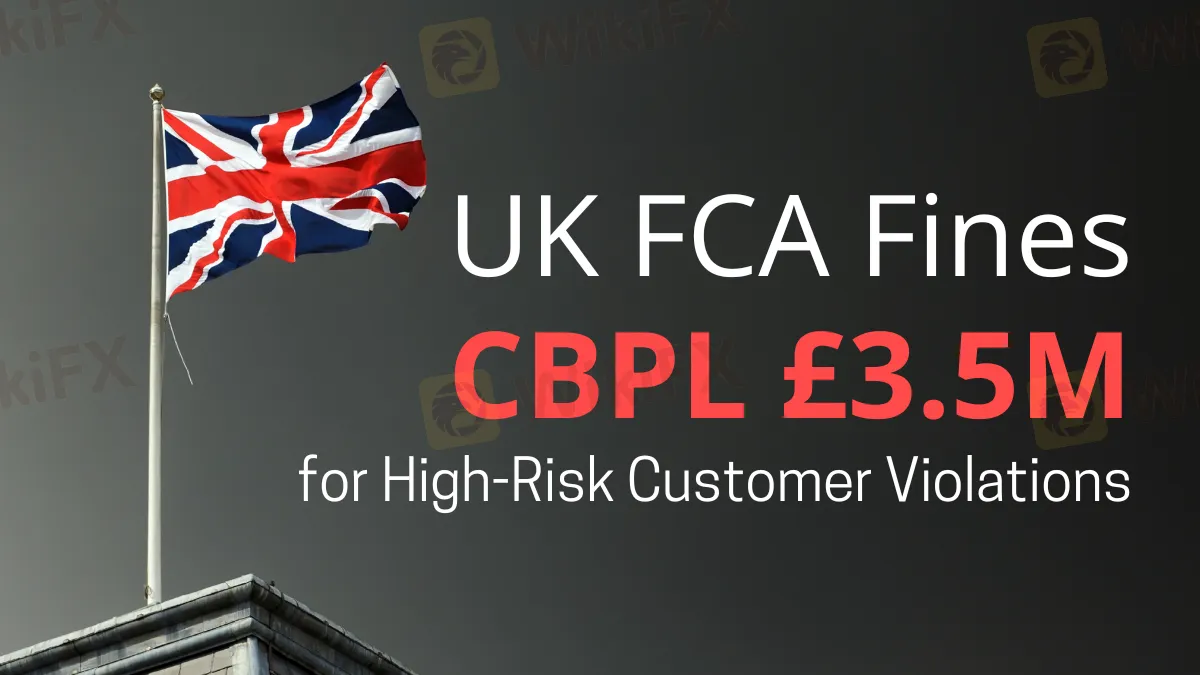简体中文
繁體中文
English
Pусский
日本語
ภาษาไทย
Tiếng Việt
Bahasa Indonesia
Español
हिन्दी
Filippiiniläinen
Français
Deutsch
Português
Türkçe
한국어
العربية
UK FCA Fines CBPL £3.5M for High-Risk Customer Violations
Abstract:The UK FCA has fined CBPL £3.5M for onboarding high-risk customers, violating regulatory requirements, and weak financial crime controls.

The Financial Conduct Authority (FCA) fined CB Payments Limited (CBPL), a member of the Coinbase Group, £3,503,546 for failing to comply with regulatory standards. The good outcomes of CBPL's inability to follow guidelines prevented it from providing services to high-risk clients.
CBPL provides a worldwide crypto asset trading platform but does not directly handle crypto-asset transactions. Instead, it allows customers to access these transactions via other Coinbase Group firms. CBPL needs to be registered in the United Kingdom to conduct crypto-asset transactions.
CBPL Exceeds High-Risk Levels
Following negotiations with the FCA, CBPL agreed on a voluntary requirement (VREQ) in October 2020. This criterion was motivated by worries regarding the efficiency of CBPL's financial crime control structure. The VREQ expressly forbade CBPL from onboarding new high-risk clients until its control mechanisms could be improved.
Despite this prohibition, CBPL accepted and served 13,416 high-risk clients with e-money services. Approximately 31 per cent of these consumers made deposits totalling USD 24.9 million. These monies were then utilized for withdrawals and crypto asset transactions via other Coinbase Group firms, totalling about USD 226 million.

CBPL violated the VREQ by failing to develop, test, implement, or monitor appropriate controls, resulting in the first FCA fine under regulations. The company should have considered all possible onboarding techniques and effectively monitored compliance. As a result, several severe breaches went unnoticed for almost two years.
Therese Chambers, the FCA's Joint Executive Director of Enforcement and Market Oversight, underscored the seriousness of the situation: The money laundering concerns linked with cryptocurrency are evident, and enterprises must take them seriously. Firms that support crypto trading, such as CBPL, must have rigorous financial crime controls.
Chambers said, “CBPL's controls had major flaws, which is why the restrictions were enforced. CBPL, on the other hand, consistently violated these rules. This enhanced the likelihood that criminals would utilize CBPL to launder their money. We will not allow such leniency, which endangers the integrity of our markets.”
Conclusion
This is the FCA's first enforcement action under the 2011 Electronic Money Regulations. CBPL agreed to remedy the situation, which resulted in a 30% reduction in the punishment. The FCA's decisive action emphasizes the significance of financial solid crime controls in the fast-changing crypto asset business.
For trending news, access the daily news on the financial market here.

Disclaimer:
The views in this article only represent the author's personal views, and do not constitute investment advice on this platform. This platform does not guarantee the accuracy, completeness and timeliness of the information in the article, and will not be liable for any loss caused by the use of or reliance on the information in the article.
Read more

The Funded Trader: Reactivates Accounts with Revised Payout Structure
Proprietary trading firm The Funded Trader has detailed its financial recovery efforts following a turbulent period marked by an unsustainable payout model. Addressing these challenges publicly, the firm outlined the steps being taken to resolve outstanding obligations and ensure operational sustainability.

Doo Group Broadens Global Footprint with Indonesian Broker Acquisition
Doo Group has announced its acquisition of PT Prima Tangguharta Futures, a Jakarta-based broker specialising in online derivatives trading. This move represents a significant step in Doo Group's regional expansion strategy and reinforces its growing presence in Southeast Asia.

Google Warns of New Deepfake Scams and Crypto Fraud
Google exposes deepfake scams, crypto fraud, and app cloning trends. Learn how to spot these threats and safeguard your data with expert tips and advice.

Why Is UK Inflation Rising Again Despite Recent Lows?
October inflation rises to 2.3%, driven by energy costs. Renters face 8% annual hikes, while house price inflation climbs. Interest rates stay elevated.
WikiFX Broker
Latest News
Webull Partners with Coinbase to Offer Crypto Futures
eToro Expands Nationwide Access with New York Launch
GCash, Government to Launch GBonds for Easy Investments
Why Is UK Inflation Rising Again Despite Recent Lows?
Interactive Brokers Launches Tax-Friendly PEA Accounts in France
Find Regulated Brokers from A to Z on WikiFX
Countdown to WikiEXPO Dubai 2024 — “Seeing Diversity, Trading Safely”
Former Director Sentenced for Share Disclosure Breach
PayPal Expands PYUSD Use for Seamless Cross-Border Transfers
Trump Media in Talks to Acquire Crypto Firm Bakkt
Currency Calculator


